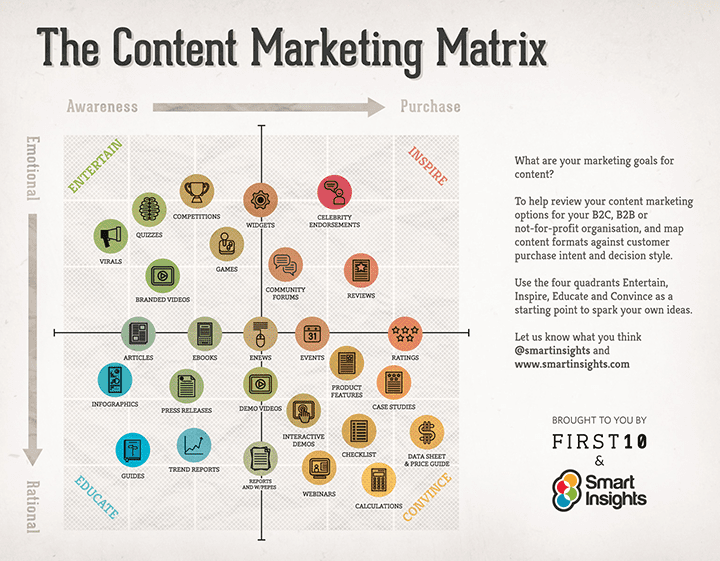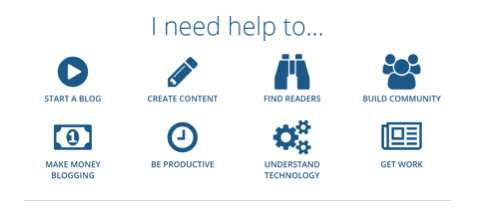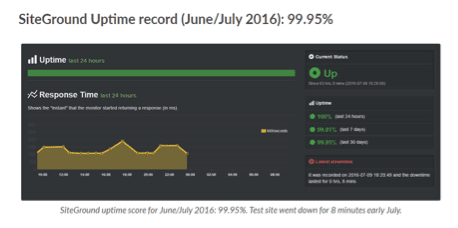Creating a Bigger and Better Blog for 2017
It’s no secret that the most, if not all, profitable niches in online marketing are already highly saturated. If you think you have an idea for a new blog topic, there are probably a thousand blogs that already published the same post. And in time, there'll be more content than humans can consume – resulting in “Content Shock."
Remember that the fundamental law of supply and demand affects everything. The price for any commodity falls when supply exceeds demand. But when it comes to content marketing, you end up paying your audience to consume your content because there’s no price for them to begin with.
In addition to time, thriving bloggers now need to invest in tools and resources that help with content creation. It’s also common for bloggers to bribe their audience into subscribing with free eBooks, discount coupons, and free trial periods.
Whether you feel that your blog is better than others is immaterial. If you want your blog to stay relevant for the upcoming years, you need a solid strategy that efficiently produces and delivers great content to your target audience.
1. Review and Refine Your Content Plan
A blog that stands the test of time is built correctly from the ground up. The first thing you need to look at is your content plan. Start by getting to know your target audience from the inside and out. If you want to build readership, you need to write for them – not for yourself and see who’ll be interested in your stuff.
The online audience is attracted to value. If you consistently provide content that educates, entertains, or encourages action, then people will be naturally drawn to your blog.
To determine what topics matter to them, one strategy is to use Alexa to profile your competitors’ readers. Simply key in your top competitor’s URL to learn information about the audience such as gender, browsing location, and popular search keywords. You can also use Google Keyword Planner for more search keyword ideas.
Next, you can gain an idea of your audience's content preferences using a content research tool like BuzzSumo. Not only will it help you determine the topics and content types that get the most engagement, but it will also help you identify key influencers that can help promote your blog.
To put everything together, make sure you define your blogging milestones that will help you track your progress and tweak your strategy over time. There’s no specific rule for this, so feel free to write anything like the following:
- Reach 1,000 subscribers in your email list
- Make your first $1,000 through ad revenue
- Reach 10,000 visitors per month
Now that you have a good idea on what you want to achieve with your blog, it’s time to develop a content plan for your blog to ensure that your goals will be reached.

The Smart Insights Content Marketing Matrix above should help you determine the main goals that you need to accomplish for your blog this year. Developing a content marketing strategy around your goals will make for an organized plan so you can engage and captivate your audience by producing the right content types.
Below are practical tips for each quadrant that you can use on your blog.
- Entertain (awareness and emotion) - Use memes on social media or your content to engage your younger audience, assuming that you are targeting that demographic. If humor is not part of your blog’s core values, you can launch fun quizzes and games similar to Buzzfeed’s that reveals information about themselves.
- Educate (awareness and rational) - Publishing how-to posts and guides about topics related to your niche will keep your audience informed with accurate data. It would be best that you apply the educational aspect of the matrix to your evergreen content, which will be discussed later.
- Inspire (emotional and purchase) - Your audience wouldn’t want to read a ghost town of a blog. Therefore, you need to learn how to drive comments or increase the social shares of your blog posts so they will know that you have an established readership. Also, you can make use of user-generated content like guest posting and reviews about your writing to increase your profile in their eyes.
- Convince (rational and purchase) - You need to beef up your blog with authoritative content to impose your knowledge to you audience who will view you as a thought leader in your niche. Developing ebooks, white papers, and checklists allows you to put your skills to good use. For maximum effect, you can use your exclusive content as an opt-in bribe if you are building an email list.
2. Set up Your Landing Pages
To build your blog readership, you need a lead generation strategy that can turn visitors into subscribers and potential customers. A key component for this would be your landing pages where most conversions happen.
To be efficient in converting your audience, a landing page must be well-designed. It must include all the right elements that will draw your audience’s attention and eventually lead them to the subscribe button:
- Headline – There are several approaches to writing an intriguing headline. A good strategy is to be specific and uses exact numbers such as "Grow Your Traffic by 200%” or “Attract 100,000 Visitors in One Month”. Also keep your headline short and focus on the first and last three words.
- Description – Remember to be concise and straightforward with your description. Don’t oversell and stop after you’re done highlighting the key benefits of signing up.
- CTA – The call-to-action is usually embedded within the opt-in button itself. Again, be straightforward and focus on the benefits. Rather than using "Sign Up Now," try something like "Get Free Access Now" or "Download the Full Report Now."
Darren Rowse is one of the most popular bloggers in the world. The homepage of Problogger.net, reflects this.
Looking at the above the fold section, you will easily read a short and clear description of what the blog is all about presented as a series of tasks. It cuts right to the chase and gives visitors a quick taste of what to expect when reading through its content.

Speaking of the content, browsing down the homepage will reveal to you a section of topics covered by the blog. The heading “I need help to…” speaks from the position of the visitor, which is a perfect way to cue them into the categories found in the blog. Clicking on any of the topics will bring them to the page that contains the posts about the topic.
3. Build Evergreen Content
You can’t count on new content to bring steady traffic to your website. That’s why you need evergreen content as the foundation where your blog rests on.
Simply put, evergreen content offers information that has relevance and value for the long-term. To write them, focus on fundamental knowledge, actionable tips, time-tested strategies, or the history behind something.
Below are other tactics that you must implement to ensure that you content stands up to the test of time.
- Choose the best keyword possible - To help make the most out of your evergreen content, you need to determine a target keyword that is the easiest to rank for. Find one that has a relatively sizable monthly search volume and has the lowest competition. Using tools like SEMrush and LongTailPro should make the job much easier for you since both feature keyword competitiveness for every search phrase you enter.
- Be exhaustive as possible - That means you’ll have to write content that’s at least 2,000 words long. Cramming in as much relevant information as possible will only benefit the intended audience in their pursuit of knowledge. Just as important, longer content increases your chances of ranking on the first page of search results, which should help your post to receive more visitors.
- Regularly update your content - Since information tends to change over time, you need to keep your evergreen content updated as well to provide accurate data to your readers. By updating your content, you also keep it fresh so search engine spiders can reindex your page and possible rank it at a higher position.

Looking at WHSR's SiteGround review as example, you will easily see how this post will be very informative for its target readers. The way the review breaks down SiteGround into its most important elements and distinguish each as pros and cons makes it easier for visitors to see what makes the tool good. Also, the screenshots featured all over the page showing how fast and reliable SiteGround is serve as social proof to readers.
All these elements in the content not only helps readers understand how SiteGround operates, but also allows them to make an informed decision on whether to purchase it as their web hosting or not. These are the reasons why this type of content can be described as evergreen.
4. Learn Where to Promote Your Content
Bringing people to your blog isn’t about who has the best content anymore. It’s all about positioning and promoting your website for better discoverability.
While well-established blogs have the upper hand when it comes to the resources and connections that bring exposure, you can still keep up with them by making an effort in optimizing sharing and distribution channels for your content. Social media is a great example since it is used by billions of users with different preferences.
You can also leverage the online reach of influencers by launching a blogger outreach campaign. This involves associating yourself with the main influencers who can write or share posts about your brand.
Below are other tools you can use to look for influencers:
- Ninja Outreach - If you want a simple solution for your blogger outreach/influencer marketing needs, then this email outreach outreach ought to do the trick. You can search for influential bloggers from the platform itself and send customized emails to each to simplify the process of reaching out to your audience with the help of publishers.
- Traackr - The premiere influencer marketing platform connects you with the best publishers from your respective fields. You can ask for their help to promote your content and spread the word about your blog.
- FollowerWonk - This tool can help you determine which Twitter influencers related to your industry you need to follow. It lets you analyze their followers as well so you can get a better idea on how they engage with their audience on this social media platform.
- PeerIndex - Aside from influencer marketing, PeerIdex (formerly Brandwatch) can help you with your PR, reputation, and advertising needs. The tool also lets you gather consumer insights so you can better feel the pulse of your audience and help you come up with engaging topics to discuss with them.
You can refer to this post to learn more about promoting your blog through social media and blogger outreach.
5. Track and Measure
If you want your blog to proliferate, you need to treat it like a business that requires constant attention. Aside from using your blogging milestones as a guide, you should also specify key performance indicators or KPIs that can help you check what’s working and what isn’t.
For most blogs, below are the KPIs you need to look at:
- Page Traffic and Traffic Sources – How many visitors do you get and where are they coming from?
- Bounce Rate – What is the likelihood of someone exiting your blog before clicking anything else?
- Social Media Shares – How much social media shares does your content generate?
- Click-Through Rate – Are your headlines effective in capturing your audience’s interest?
- SEO Rankings – Where is your site positioned in search engine results pages?
- Email Subscribers – How many leads do you have on your email list?
- Conversion Rate – How optimized are your landing pages in securing conversions?
One of the best tools that can help you with your tracking needs is Google Analytics, but you’ll also need analytics platforms for SEO, social media, and email marketing. You can refer to this post for a long list of the best tools you can use.
Final Thoughts
If you want to succeed as a blogger, you need to up your game and settle for anything less than your best job. The things outlined above are only guidelines on what you can do to improve. Ultimately, it’s up to you if you’re willing to put in the extra work for making your blog grow and shine through the content noise.

Thanks to
Christopher Jan Benitez for sharing their advice and opinions in this post. Christopher Jan Benitez is a professional content marketer and writer. He has helped small businesses achieve their goals by implementing a strong content strategy that emphasizes their unique selling points and promoting created content using effective online channels and methods, in particular social media
marketing and search engine optimization techniques.






 Thanks to
Thanks to 


